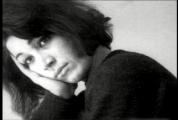
Discussion | Iran, US
Shirin Neshat: The House is Black
Monday, Jun 8th 7:00pm
$10
Iranian-American filmmaker Shirin Neshat presented a rare screening of Forough Farrokhzad’s landmark short film The House is Black (1962) together with her own short film, The Last Word (2003).
Proclaimed by director Mohsen Makhmalbaf as “the best Iranian film,” The House is Black is credited with ushering in the New Wave in Iranian cinema. This unsparing portrait of human suffering weaves haunting narration together with lyrical fragments of Farrokhzad’s poetry, the Qur’an, and the Old Testament.
Forough Farrokhzad has been an important inspiration to Neshat, perhaps most directly in The Last Word which depicts the interrogation of a female writer whose work has been deemed dangerous by a brutal bureaucratic establishment. A chilling testament to the power of art, The Last Word culminates with a searing recitation of Farrokhzad's poetry.
Neshat was joined in conversation by Ahmad Karimi-Hakkak, Founding Director of the Center for Persian Studies at the University of Maryland, and poetry editor of Strange Times, My Dear: The PEN Anthology of Contemporary Iranian Literature (2006).
For more information about Forough Farrokhzad, please see the Forugh Farrokhzad's Open Forum Web Site
Support for Muslim Voices: Arts & Ideas education and humanities programming at BAM is provided by the Gladys Krieble Delmas Foundation.

Considered to be one of Iran's most influential poets and filmmakers of the Twentieth Century, Forough Farrokhzad's work confronted themes of trauma and alienation. Read more about Farrokhzad's life and work in Prof. Ahmad Karimi-Hakkak's essay.


